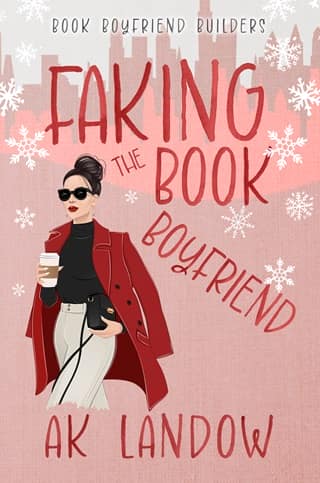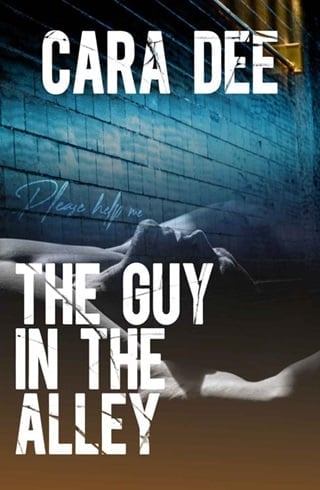25. Nova
25
NOVA
I wake up alone in Sam’s bed.
My hand automatically reaches for his warmth before my brain catches up. The sheets on his side are cold.
But I mean, c’mon—of course they are. Last night’s vulnerability—the whispered confessions, the way he held me as I shared my darkest fears—was an anomaly. A crack in his armor that’s probably already been welded shut.
I get up and go shuffling down the hallway, bathrobe cinched tight around my waist. It’s mostly dark, though some gray, pre-dawn gloom trickles in between blinds and through the skylight.
I’m almost at the kitchen when I hear a noise behind me and double back. To my surprise, Samuil’s office door is cracked open instead of hermetically sealed and triple-locked like it usually is.
Curiosity takes over. I stick an eye to the thin sliver of a gap.
He’s there. Seated behind his desk, radiating the kind of coiled tension that makes my stomach clench. His fingers fly across his phone screen as he fires off texts, jaw tight, shoulders rigid.
When he notices me hovering in the doorway, I smile.
But his expression doesn’t soften.
“Get dressed,” he says, eyes dropping back down again. “We’re going out.”
The order—because that’s exactly what it is—makes me bristle. I’d started to believe I was more than his prisoner, but maybe that was stupid of me. One emotional night doesn’t erase the power dynamics between us.
I’m still the dogwalker he’s keeping under lock and key.
He’s still the man who can make Chicago dance to his tune.
I open my mouth to object, but then he glances up once again. And this time, something in his steel-gray eyes makes me pause.
“There’s something I want to show you,” he adds quietly.
The gentleness in his voice is the same from last night, when he traced my scars in the dark and told me I was brave.
So, against my better judgment, I agree.
I go and get dressed quickly. When I reemerge, he meets me by the elevator. As soon as I approach, though, he turns his back to me. I can’t pretend it doesn’t sting, though I can’t quite explain why, either.
The ride down is silent. So is the drive from the penthouse to wherever the hell we’re going, not that he’s given me any clue as to where that might be.
Something I want to show you. That could be anything. It could be a grungy kill shack on the South Side or a freaking unicorn he bought for the Chicago Zoo.
Myles trails us in another black SUV, because apparently, a simple morning drive requires a full security detail. I stare out the window as Sam navigates Chicago traffic, his hands steady on the wheel, his profile carved from granite.
Then I spot the familiar storefronts of my old neighborhood, and my heart kicks against my ribs.
“Why are we in Irving Park?” I ask, sitting upright. When Sam’s jaw only tightens, I push harder. “You planning to give me a tour of my childhood trauma spots? Because I’ve got to say, that’s a weird date.”
His lips twitch, but he keeps his eyes on the road. “You talk more when you’re nervous.”
“And you talk less when you’re plotting something,” I shoot back. “Which is impressive, considering your baseline is practically mute.”
We turn onto a street that makes my chest squeeze tight. I know every crack in these sidewalks. Every faded awning. This was my escape route when home got too suffocating—past Mario’s bodega, around the corner from St. Viator’s, and straight to...
Oh.
The convoy of black SUVs pulls up to the weathered brick building of the Chicago Animal Haven. My sanctuary. The place that saved me when I was healing from the dog attack, when I was running from my father’s house, when I needed somewhere to pour my love that wouldn’t use it as a weapon.
How does Sam know about this place?
More importantly—why would he bring me here?
Sam kills the engine but doesn’t move to get out. Instead, he turns those storm-gray eyes on me.
“This is your favorite place in Chicago,” he says. Not a question.
My throat locks up. “Been doing your homework on me?”
“Always.” His bluntness shouldn’t make my pulse skip, but it does. “You volunteered here every Saturday for eight years. Started when you were fifteen. You’d walk three miles each way because your father wouldn’t drive you.”
The fact that he knows these details about my past—details I never told him—should terrify me. Instead, I’m caught between wanting to slap him and wanting to ask what else he knows about the girl I used to be.
“If this is some kind of power play?—”
“Nova.” He cuts me off, voice soft but firm. “Let’s go inside.”
I glance in the side mirror. Myles has positioned his SUV to block the street, while two other security guys I don’t recognize are already doing a perimeter check. It’s like watching a military operation just to visit a bunch of homeless pets.
“What’s with the entourage?” I ask. “Worried some aggressive chihuahuas might make a move on the big, bad Bratva boss?”
His mouth quirks. “You’d be surprised what some people would do to get to me.”
He exits the car and comes around to my side, opening my door with that old-world courtesy that always throws me off balance. As if I’m some precious thing to be protected, not a prisoner being escorted to her next holding cell.
Even if that cell happens to be my favorite place in the world.
The shelter’s front door chimes just like always, unleashing the familiar cacophony of barking and meowing that used to be my favorite soundtrack. Susan Chen, the shelter director who’s run this place since I was a scared teenager seeking refuge, looks up from the front desk.
“Nova! My sweet little angel, you look exactly like I remember you did back when—” Her face lights up with her usual warmth, then freezes as Sam steps in behind me. “Oh. Mr. Litvinov. I—I wasn’t expecting you today.”
The change in her demeanor is a brutal record scratch. Gone is the chatty woman who used to share her lunch with me and tell me stories about each animal. In her place is someone almost painfully professional, her spine straight as a ruler.
“Mrs. Chen.” Sam nods, and somehow, even that small gesture carries the weight of command. “How are the renovations coming along?”
Renovations? I scan the lobby, really seeing it for the first time. Now that he mentions it, the signs of newness are everywhere. The scuffed linoleum I remember has been replaced with clean tile. New kennels line the walls, the metal gleaming. Even the air smells fresher.
That’s when I spot it. The bronze plaque mounted beside the intake area:
“ Chicago Animal Haven
Renovated through the generous support of the Litvinov Group”
My head snaps toward Sam. He’s watching me, his expression unreadable except for a slight tightness around his eyes.
“I’ve owned the building for three years,” he says matter-of-factly, as if commenting on the weather. “And before you ask, no, it’s not profitable. The rent they pay barely covers utilities.”
He says it without an ounce of emotion, like it’s just another business transaction. Like he didn’t just reveal that he’s been quietly supporting my safe haven long before he knew me.
Somehow, that makes it mean so much more.
“Let me show you around,” Susan says, but her eyes flick to Sam for permission. When he nods, she leads us past the public areas into the quarantine section where they keep the more challenging cases.
The barking intensifies as we walk down the corridor. I’ve always loved this part—seeing the progress of the difficult ones, the ones everyone else has given up on. I can’t help murmuring names of dogs long ago taken home by happy families. Can’t stop myself from imagining them in endless backyards, chasing endless happy children and living endless happy lives.
Susan walks alongside me. Seeing her again is amazing. Under other circumstances, I’d want to sit in puppy puddles and laugh and tell stories with her like we used to do.
But today, something’s different. The animals react to Sam’s presence like they sense exactly what he is: a predator among predators.
We stop at the last kennel. Behind the reinforced gate, a lab mix with a knot of scars across her chest starts a low warning rumble in her chest.
“Poor thing,” Susan said. “Ruby is her name. We found her in an abandoned home. She’s had a hard life. Too hard. But she’s sweet at heart, I really think she is. Just needs the right kind of love. I’m hoping that?—”
She breaks off as Sam steps closer to the cage.
The dog goes absolutely still.
My breath catches. I know that stillness. It’s the same way I go quiet when Sam enters a room—not from fear, but from recognizing something primal. The capacity for violence doesn’t always equal the desire to use it. Sometimes, it means understanding the need to protect what’s yours.
“The key,” Sam says quietly.
Susan starts to protest, but he holds out an open palm and she shuts up. Her hands shake as she passes the key to him. His don’t tremble at all.
He unlocks the gate. I hold my breath. So does every other dog in the building.
The dog approaches slowly, head low. Then, in a move that makes Susan gasp…
Ruby drops and shows her belly to Sam.
I watch Sam crouch and lay one huge hand on the dog’s scarred torso. His touch is gentle, but I can see the lethal strength he keeps carefully leashed. Just like I can see the moment the dog accepts him as alpha.
“We’ll take her,” Sam says, and it’s not a request. “Have the paperwork ready when we leave.”
Something warm and dangerous unfurls in my chest. It feels a lot like understanding. A lot like falling.
The morning sun feels deceptively bright as we exit through the shelter’s back door, Sam’s hand resting lightly on my lower back the whole time. My own hand is clutching a sheaf of papers: adoption forms for Ruby, who’s going to come join us as soon as the vet comes by the facility and gives her the all-clear.
We’re almost to the SUV when I hear the scuffle—sneakers scraping concrete, a young voice protesting, deeper voices growling threats.
When we turn in unison, I see why.
Two cops have a teenager pressed against a car in the alley. My lungs seize in instant recognition. I know one of them—Officer Martinez. He used to come to my father’s poker nights. He wore too much cologne and smoked too many cigarettes, I remember. It always used to make me cough when he demanded I give him a hug.
Martinez spots me and his face lights with recognition. “Nova Pierce? Holy shi?—”
Then his eyes slide past me to Sam.
The change is instant and visceral. Martinez goes pale, actually stumbles back a step. His partner’s hand drops from the kid’s collar like it’s been burned.
“M-Mr. Litvinov,” Martinez stammers. “We were just—this kid was?—”
“Leave.” Sam’s voice is soft. Deadly. Undeniable.
They practically trip over themselves backing away, muttering apologies that scatter in the wind. The teenager takes off running the opposite direction, not even questioning his luck.
Me, however?
I’m frozen. Can’t move. Can’t breathe.
The shelter visit suddenly crystallizes into something else entirely. Less about Sam showing me his softer side, more about him proving a point.
In his world, even the dogs and corrupt cops bow down.
I’m not sure if that makes me feel safer or more terrified.
The cops and the kid are both gone within seconds, but the panic remains. My chest constricts, vision tunneling, that old, familiar helplessness clawing up my throat. I hate this—hate that my body betrays me, hate that Sam has to see me weak again.
But Sam doesn’t try to fix me or dismiss what’s happening. He just guides me into the waiting vehicle, his huge frame blocking anyone from seeing my breakdown. His hand finds my back, warm and steady.
“Breathe with me,” he murmurs. “In through your nose, out through your mouth. Good girl.”
I should bristle at the praise, at him treating me like one of the rescue animals. Instead, I focus on the rhythm of his breathing, on the anchoring weight of his palm between my shoulder blades.
When the world finally stops spinning, I realize I’ve somehow ended up with my face pressed against his chest, his scent mixing with the lingering shelter scents of disinfectant and dog. The combination shouldn’t be comforting. It is anyway.
“Why did you really bring me here?” I ask, my voice raw. “Was it just to show off your reach? To remind me you own everything in my world?”
Sam’s chest rises on a deep breath. His fingers trace idle patterns on my back.
“Because,” he says finally, voice low and intent, “you need to understand what choosing to stay with me means. Both the good and the bad.”
I pull back enough to see his face. His expression is granite, but his eyes... his eyes tell a different story.
“And if I don’t choose to stay?”
His jaw tightens. He doesn’t answer.
He doesn’t have to.
We both know I’m not going anywhere.
The ride back to the penthouse is just as quiet as the way here, but with none of the lingering tension. Sam’s phone buzzes twice more, but he ignores it, keeping one hand steady on the wheel.
The other has somehow found its way to my knee, his thumb tracing absent circles that make my skin tingle even through my jeans.
I should pull away. Should remember all the reasons this man is dangerous.
Instead, I find myself leaning into his touch, just as I’m starting to lean into all the complicated pieces of him.
The penthouse lobby is a blur of marble and mirrors. As soon as the elevator doors close, Sam crowds me against the wall, his huge frame blocking out everything else. But he doesn’t kiss me. Just rests his forehead against mine and breathes.
“You okay?” he asks roughly.
I’m not sure how to answer that. I’m not sure I’ll ever be okay with how easily he commands every room he enters, how the fucked-up cops who terrorized my childhood scurry away at his mere presence.
But I’m starting to be okay with how safe that makes me feel.
The elevator chimes before I can reply. From within the penthouse, Rufus comes bounding toward us, his entire body wiggling with joy. The sight makes me laugh—this huge, goofy dog who loves Sam as fiercely as I’m starting to.
Then Sam’s phone buzzes again. This time, he checks it.
I watch the transformation happen in real time. The softness in his eyes hardens to steel, his jaw setting like concrete. When he answers Myles’s call, his voice carries none of the gentleness from a moment ago.
“How many?” A pause. “And you’re sure it was them?” Another pause, longer this time. “No. We handle this my way. Have the team ready in an hour.”
He ends the call and turns to me. The man who rescued a dog and held me through a panic attack is gone, replaced in the blink of an eye by someone who makes Chicago’s underworld tremble.
“The Andropovs are making moves,” he says, already typing on his phone. “I need to handle it.”
My stomach clenches. I’ve heard enough about the rival family to know this isn’t just business—it’s war. The kind that leaves bodies in the Chicago River.
Sam must see the fear in my eyes because he steps closer, cups my face in his huge hands. “I’ll be back,” he says, and though it’s not quite a promise, I find myself believing him anyway.
Maybe because in the weeks I’ve known him, Samuil Litvinov has never lied to me. He’s hidden things, yes. Kept secrets that could fill Lake Michigan. But he’s never made promises he couldn’t keep.
It’s more than I can say for the laws my father swore to uphold, or the justice system that was supposed to protect people like me.
“Be careful,” I whisper.
Sam’s lips twist. “Always am, little fighter.” He brushes a kiss across my forehead that feels like a brand. “Try not to stage any revolutions while I’m gone.”
Then he’s striding toward the door, already barking orders into his phone, leaving me with an anxious dog and the sinking feeling that I’m falling for exactly the kind of man I should be running from.
But maybe that’s the thing about falling: by the time you realize it’s happening, it’s already too late to stop.
 Fullepub
Fullepub 



